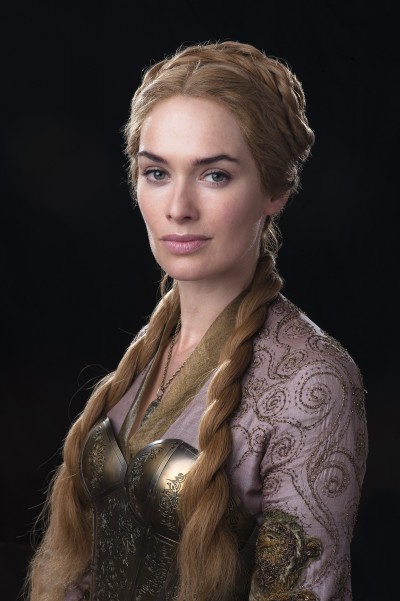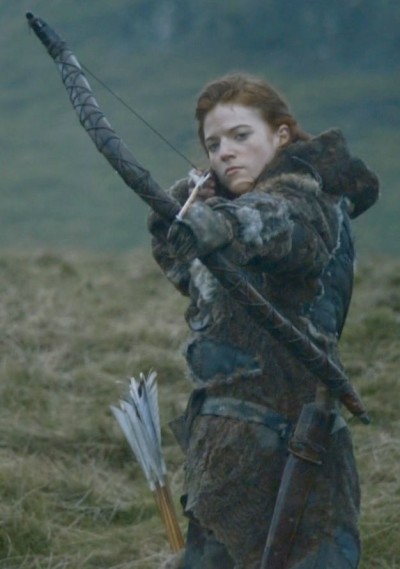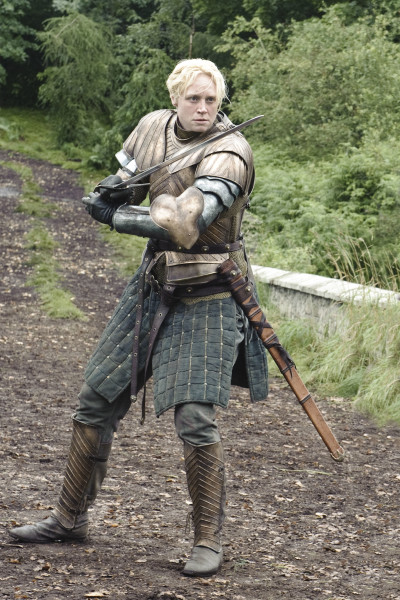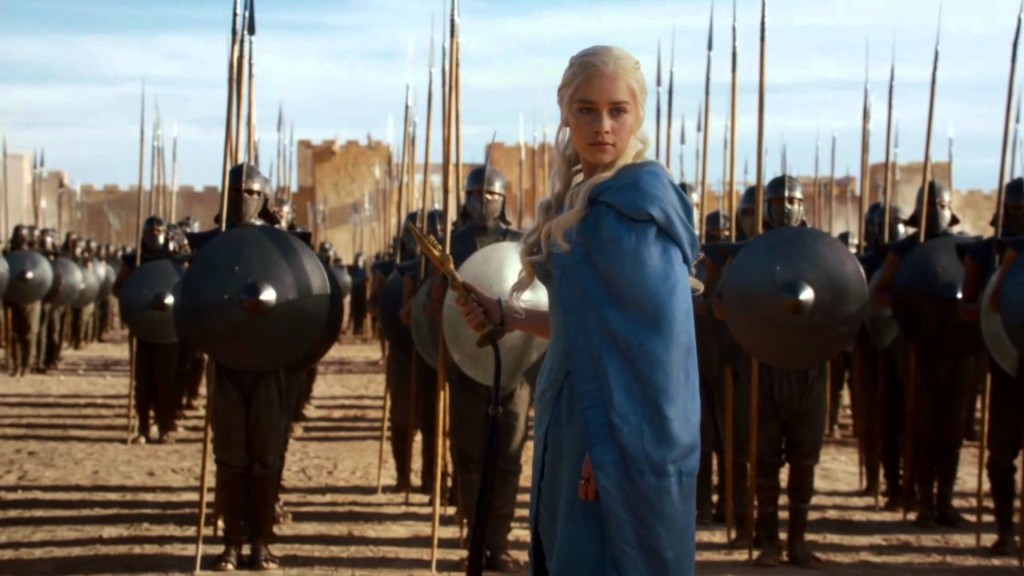“All men must die. But we are not men…” — Daenerys Targaryen
We don’t have HBO, so were late getting into Game of Thrones, only starting to watch it after I accidentally stumbled across a copy [let’s just say, it had Chinese subtitles…]. Being tardy has its benefits: we could binge watch our way through multiple episodes, and I’m wondering how we’ll cope having to join the masses for Season 4, rationed to one episode per week. And it appears we were not alone: it’s one of the rare cases were a show has grown much more popular over time. The first ever episode was watched by only 2.22 million people on HBO. The second season opened 74% higher, at 3.86 million, and by the time the third series ended, viewing figures all the way up at 5.39 million. This mirrors the pattern of the books by George R.R. Martin on which the series is based: the first wasn’t a hit at all on its publication in 1991. But by the end of July 2011, he had five books in the New York Times top 20 bestsellers for fiction.
It’s utterly addictive, and populated with any number of great characters; indeed, some kind of scorecard would probably help in the early going, to keep track of who is marrying, supporting, invading or killing whom. Perhaps the outstanding aspect for me is the way characters are nuanced, something especially noteworthy for the villainous. Even as they are committing heinous acts, you usually understand the reasons why they’re doing them. If you may not agree with the purpose to which they are aimed, you can see the justification. Well, except for boy-king Joffrey. He’s just a little shit, who has somehow managed to avoid the claws of the grim reaper. And speaking of which, another defining factor of the series is: anyone can die, at any time. No matter how beloved, Mr. Martin does not care. You can traumatize any GoT fan by sidling up to them and whispering two words in their ear: “Red Wedding.” I’ll say no more than that.
“The more people you love, the weaker you are.” — Cersei Lannister
 It certainly is a show ‘for mature viewers,’ containing its fair share of violence and sex, which has naturally led to the usual accusations of the usual misogyny from the usual sources. I don’t think the reality is anywhere near as simple as this, not least because the creators are pretty much equal opportunity when it comes to character abuse. Sure, sexual assault is skewed towards the women; decapitation, on the other hand, is pretty much a male preserve. No-one gets out unscathed: man, woman, child or wolf. There’s also an obvious difference between depiction and endorsement. And it’d be kinda ludicrous to have a medieval-styled fantasy world, operating as some kind of anarcho-syndicalist commune, where people take it in turns to be a sort of executive officer for the week, but all the decisions of that officer have to be ratified at a special bi-weekly meeting. Boring as shit, too.
It certainly is a show ‘for mature viewers,’ containing its fair share of violence and sex, which has naturally led to the usual accusations of the usual misogyny from the usual sources. I don’t think the reality is anywhere near as simple as this, not least because the creators are pretty much equal opportunity when it comes to character abuse. Sure, sexual assault is skewed towards the women; decapitation, on the other hand, is pretty much a male preserve. No-one gets out unscathed: man, woman, child or wolf. There’s also an obvious difference between depiction and endorsement. And it’d be kinda ludicrous to have a medieval-styled fantasy world, operating as some kind of anarcho-syndicalist commune, where people take it in turns to be a sort of executive officer for the week, but all the decisions of that officer have to be ratified at a special bi-weekly meeting. Boring as shit, too.
Indeed, perhaps the oppressive world is a seed for the admirable number of strong female characters, which likely surpasses just about any other show on television these days. If you’re a man, you can be remarkably stupid and still do well in the GoT world, as long as you are fairly good at hitting people: Exhibit A, Jon Snow. As a woman, if you’re dumb, you learn quickly, or you don’t survive. If you’re weak, you don’t survive. Since you generally don’t have the option of direct physical force, other means must be found to bend others to do your will. This need not be malicious: Catelyn, matriarch of the Stark family, used family ties and other appeals to loyalty to amass her army. Others are less high-minded; to quote Cersei Lannister, “Tears aren’t a woman’s only weapon. The best one’s between your legs.” And make no mistake, some of the ladies in GoT are perfectly willing to use it, as part of their arsenal of tools.
But only some, for the variety of characters on offer here is another delight, from whores to high priestesses, queens to barbarians (even barbarian queens!), five foot short to six foot three tall, ages nine to eighty and everywhere in between. As the fourth season starts up on Sunday, here are our ten favorites ladies in the Game of Thrones universe to date – in increasing order of action heroineiness. Note: I’ll try and avoid major spoilers – for example, which if any of these are no longer alive! – but where these are necessary to illuminate a character, I’m not going to shy away from them.
“Some day I’m going to put a sword through your eye and out the back of your skull.” — Arya Stark
10. Shae
In terms of social climbing, few can surpass Shae’s ascent. She started off as a prostitute following the Lannister army, but caught the eye of Tyrion Lannister (our most beloved character thanks to Peter Dinklage’s portrayal, the self-proclaimed “god of tits and wine”) and became his exclusively – she even convinced Tyrion to defy his father and bring her to the capital. There, she now serves as a handmaiden and confidant to Sansa Stark, the one-time potential queen of the realm. Yep, Shae has come a long way.
9. Olenna Tyrell
While certainly “veteran presence,” we mentioned above that you don’t survive in this world without being smart and tough. So her lengthy tenure at the heart of court politics testifies to both, as does her nickname, the ‘Queen of Thorns.’ In many way, she’s the real head of House Tyrell, despite marrying into it, rather than through her birth. Besides, we couldn’t omit any character played by Diana Rigg, who was not just the only Mrs. James Bond (in O.H.M.S.S.), but one of the all-time GWG icons, Emma Peel.
8. Melisandre
If there’s one thing more disturbing than your average religious zealot, it’s a religious zealot, with supernatural powers, who burns people alive. That would be Melisandre, a Red Priestess of the Lord of Light, a religion that has found devotees in House Baratheon, and who has an absolute conviction in her faith, to go along with her abilities of prophecy. You get the sense there’s a lot more to her than has been seen to date, but anyone capable of giving birth to shadows that kill on command, is clearly someone to be treated with respect.
“Death by fire is the purest death” — Melisandre
 7. Ygritte
7. Ygritte
A free woman from north of the massive wall which protects the bulk of Westeros from… things, shall we say. Life up there is even more brutal, and her survival skills have helped both her and Jon Stark, with whom she has a relationship best described as “complex.” Like others from her society, she possesses a fierce independence, and her loyalty is not easily won. She has an instinctive grasp of the best way to achieve her ends, and will ruthlessly exploit any weakness. If that fails – well, there’s always her trusty bow.
6. Catelyn Stark
At first, she was a dutiful and supportive wife to husband Eddard, but Lady Stark was thrust to the front following his appointment as the King’s Hand, which eventually led to his execution after the death of the current king. As the country collapses into civil war, she strives to be reunited with her children, rallies forces against those responsible for Eddard’s death, and acts as an adviser to her son Robb, who is heading the army they have raised. Balancing these various ends is a perilous task, to say the least.
5. Yara Greyjoy
After a previous rebellion was suppressed, the Greyjoy scion, Theon, was sent off as a hostage to live with the winners, to ensure his family’s future compliance,. This forced his sister, Yara, to step into the breach and become a son by proxy, commanding her own longship and leading her men as they pillage nearby territories. To quote her father: “She’s commanded men. She’s killed men. And she knows who she is.” That’s more than Theon does, completely failing to recognize the hard-ass she has become, when he returns, after almost a decade away.
4. Cersei Lannister
Cersei is played by another solid action heroine, Lena Headey having been Queen Gorgo in 300, as well as the title role in Terminator: The Sarah Connor Chronicles. Her character is responsible for the show’s title, saying, “When you play the game of thrones, you win or you die.” And Cersei Lannister has no intention of dying, being a grand mistress at the arts of scheming, manipulation and intrigue towards her goals. Her son Joffrey is technically on the throne of Westeros, but there’s little doubt who is wielding the actual power there.
“Everyone who isn’t us is an enemy.” — Cersei Lannister
3. Arya Stark
We’re in the top tier now, and despite Arya’s youth, she undeniably deserves her position up here. Virtually the first time we see her, she’s spurning her embroidery lesson to out-shoot her brothers, and that sets the tone for her character. Per Wikipedia, “She rejects the notion that she must become a lady and marry for influence and power, showing no interest in the womanly arts of dancing, singing, and sewing; instead she revels in fighting and exploring.” Her father, Eddard, eventually admits defeat in this area, and hires a swordmaster to give her lessons in “sticking ’em with the pointy end,” an art in which Arya proves adept.
She goes with Eddard when he travels to take up his position as the King’s Hand, but when that goes pear-shaped, she’s thrown back entirely on to her own resources, with her sword, ‘Needle’. Disguising herself as a boy to avoid some of the dangers of life alone, she starts back to her family’s castle in the North. That plan is derailed and she ends up embedded deep in the enemy’s camp, acting as cupbearer to Tywin, the head of House Lannister, before escaping. At the end of the third season, Arya killed her first man, stabbing him repeatedly in the back of his neck. It’s not going to be her last, that’s for sure.
 2. Brienne of Tarth
2. Brienne of Tarth
The only child of her lord father, Brienne is bigger and stronger than most men [Gwendoline Christie, who plays her, is 6’3″ in real life, so no need for orange boxes or forced perspective there!], and we first see her winning a tournament against male opponents. This gains her entry in to the Kingsguard of Renly Baratheon, but after his assassination, she is blamed for Renly’s death and has to flee the camp, vowing to take revenge on the real instigator – who would be #8, Melisandre. Brienne swears loyalty to Catelyn Stark, and is given the mission of taking captive Jamie Lannister back to King’s Landing, where he can be exchanged for Catelyn’s daughters. That journey forces both Brienne and Jamie to face uncomfortable truths, and they develop a mutual respect.
Characters in the show are very much shaded in grey, but Brienne is perhaps the closest to being purely good, holding to a chivalric ideal of knighthood, likely more rooted in fantasy than the harsh realities of life. She has managed to hold on to her idealism, despite never being accepted by her fellow knights, or society in general: her position as a warrior woman renders her a perpetual outsider to both groups. In one of the books, she says she was “the only child the gods let [my father] keep. The freakish one, one not fit to be son or daughter.” A great character, beloved beyond the screen time she has received, and I’d love to see a spinoff series, focusing on Brienne.
1. Daenerys Targaryen
The Targaryen clan used to be the rulers of Westeros, but her father was overthrown, leaving Daenerys and her brother Viserys surviving out on the edge of civilization. Viserys still plots to regain the throne, and to this end, arranges a marriage of his sister to a barbarian warlord, Khal Drogo, hoping to use Drogo’s army. Drogo dies after a wound sustained in battle becomes infected, and most of his tribe abandon their queen. However, at this low point, Daenerys discovers her destiny, walking into her husband’s funeral pyre, only to emerge unscathed. Indeed, she succeeds in hatching three supposedly inert dragon eggs given to her as a wedding present, resurrecting a species much feared in their time, yet considered extinct for centuries. The ‘Mother of Dragons’ is on her way back up…
Having not read the books when I watched the series, my initial reaction was that Viserys would be the focus, and Daenerys little more than eye-candy, a bribe used to give her sibling leverage, who’d rapidly be sidelined. Boy, was I wrong. From a chattel, she has steadily ascended the ladder of power, first winning her husband, then his clan, and building upon that, with some help from her little fire-breathers, to become a potential force to be reckoned with. While she is still sidelined – Daenerys hasn’t even set foot on Westeros through three seasons – it’s only a matter of time before she returns at the head of an army, fanatically devoted to her. How do you like your soldiers cooked? Medium-well?
She hasn’t forgotten where she came from either, and has a zero-tolerance policy for those who oppress others. Daenerys has gone from, “I don’t want to be his Queen. I want to go home,” to “Slay the masters, slay the soldiers, slay every man who holds a whip, but harm no child. Strike the chains off every slave you see!” That’s what I call a character arc. But I do have to wonder what the future holds for her, because we should remember, her father was nick-named “The Mad King” by his subjects in Westeros, for good reason, and Viserys wasn’t exactly stable or sane. Let’s hope the insanity skips a generation: it’d waste one of the strongest and most memorable female characters on TV this decade
“We will lay waste to armies, and burn cities to the ground.” — Daenerys Targaryen















